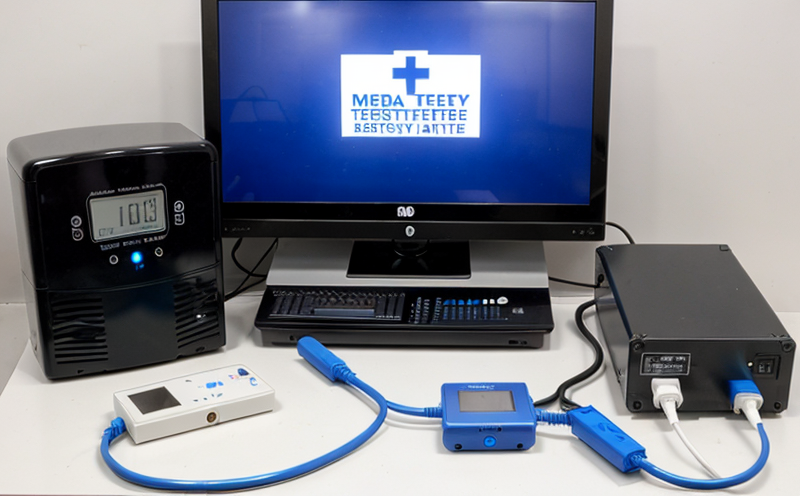ANSI C18.3M Medical Device Button Cell Battery Testing
The ANSI/CAN/UL Standard C18.3M is a critical document that sets the requirements for testing button cell batteries used in medical devices, ensuring they meet stringent safety and performance standards. This standard is essential because it helps to ensure that these batteries are reliable, safe, and effective when integrated into complex medical equipment.
The scope of this standard covers various aspects of battery testing, including but not limited to:
- Physical dimensions
- Electrical performance
- Environmental stress resistance
- Safety features and labeling requirements
Testing these batteries in accordance with ANSI C18.3M is crucial for manufacturers, as it helps to identify potential issues early in the development process. This ensures that any defects can be addressed before the product reaches the market, reducing risks associated with recalls or malfunctions.
The testing procedures outlined in ANSI C18.3M are designed to simulate real-world conditions that a medical device battery might encounter during its lifecycle. For instance, the standard covers tests for high-temperature storage and cycling, which help to ensure the battery’s reliability over extended periods of use. Additionally, there are specific tests aimed at assessing the safety features of the batteries, such as short-circuit protection mechanisms.
The ANSI C18.3M standards also emphasize the importance of accurate documentation. Manufacturers must provide detailed reports that outline the test parameters and results. These reports serve multiple purposes; they not only satisfy regulatory requirements but also act as valuable tools for quality assurance teams to monitor product performance over time.
Compliance with ANSI C18.3M is particularly important for manufacturers aiming to enter international markets, especially those regions that have stringent regulations regarding the safety and performance of medical devices. By adhering to these standards, companies can enhance their marketability while ensuring they meet global safety expectations.
The standard’s requirements are not just a formality; they reflect real-world challenges faced by medical device manufacturers. For example, the battery in an insulin pump must remain operational under extreme temperature conditions without compromising its integrity or performance. Compliance with ANSI C18.3M helps ensure this critical functionality is maintained.
In summary, ANSI C18.3M Medical Device Button Cell Battery Testing plays a vital role in ensuring that medical devices are safe and reliable for the end-users. By adhering to these stringent standards, manufacturers can enhance their product quality and meet regulatory requirements effectively.
Benefits
The ANSI C18.3M Medical Device Button Cell Battery Testing service offers numerous benefits that are crucial for the medical device industry. These include:
- Enhanced Safety: Ensures that batteries meet strict safety requirements, reducing risks of malfunctions.
- Improved Quality Assurance: Provides detailed reports that help monitor product performance over time.
- Regulatory Compliance: Helps manufacturers adhere to international standards and thereby enter new markets more easily.
- Cost Savings: Early identification of defects can prevent costly recalls and improve overall efficiency in the supply chain.
- Innovation Support: Allows for the development and testing of cutting-edge battery technologies that enhance medical device performance.
The service ensures that batteries used in critical medical devices are not only safe but also perform reliably under a wide range of conditions. This is particularly important given the high stakes involved when dealing with life-saving equipment.
Compliance with ANSI C18.3M can significantly reduce the time and effort required to navigate regulatory landscapes, allowing companies to focus more on innovation and market expansion. By ensuring that all aspects of battery performance are thoroughly tested, this service helps manufacturers build trust and credibility among their customers and partners.
Eurolab Advantages
At Eurolab, we offer a comprehensive ANSI C18.3M Medical Device Button Cell Battery Testing service that sets us apart in the industry. Our advantages include:
- Experienced Professionals: Our team comprises highly skilled and certified experts with extensive experience in medical device testing.
- State-of-the-Art Facilities: Utilizing cutting-edge equipment and facilities, we can conduct tests under the most stringent conditions.
- Comprehensive Reporting: We provide detailed reports that are not only compliant but also offer valuable insights into battery performance.
- Regulatory Expertise: Our team is well-versed in international standards and regulations, ensuring compliance with ANSI C18.3M.
- Prompt Delivery: We understand the importance of timely testing and reporting to meet your project deadlines.
The combination of our expertise, advanced facilities, and commitment to quality ensures that you receive reliable results every time. By choosing Eurolab for your ANSI C18.3M Medical Device Button Cell Battery Testing needs, you can be confident in the reliability and safety of the batteries used in your medical devices.
Use Cases and Application Examples
The ANSI C18.3M Medical Device Button Cell Battery Testing service has a wide range of applications across various sectors, particularly in the healthcare industry. Some key use cases include:
- Pacemakers: Ensuring that pacemaker batteries are reliable and safe over long periods.
- Verifying that insulin pump batteries can operate safely under extreme conditions.
- Guaranteeing the safety and reliability of ICD batteries to ensure proper function during emergencies.
- Testing dialysis machine batteries for consistent performance in home settings.
- Ensuring that monitoring devices used in critical care units have reliable battery power.
In each of these applications, the ANSI C18.3M Medical Device Button Cell Battery Testing service plays a crucial role. By conducting rigorous testing according to this standard, we ensure that batteries used in medical devices are not only safe but also perform reliably under various conditions. This is especially important for devices that depend on battery power for their critical functions.





